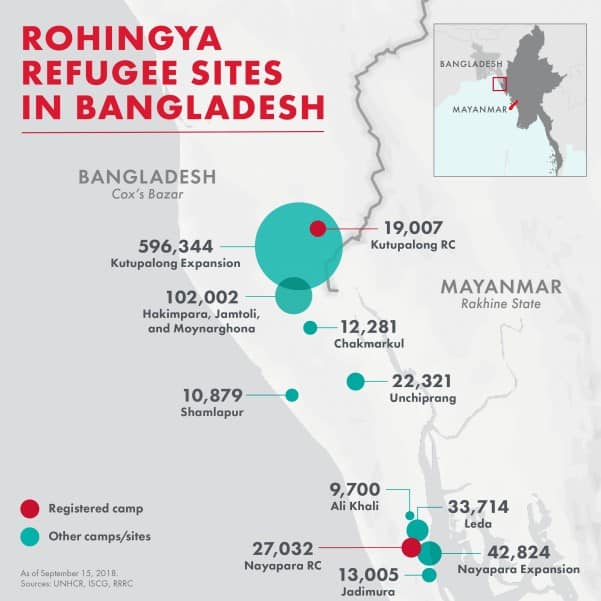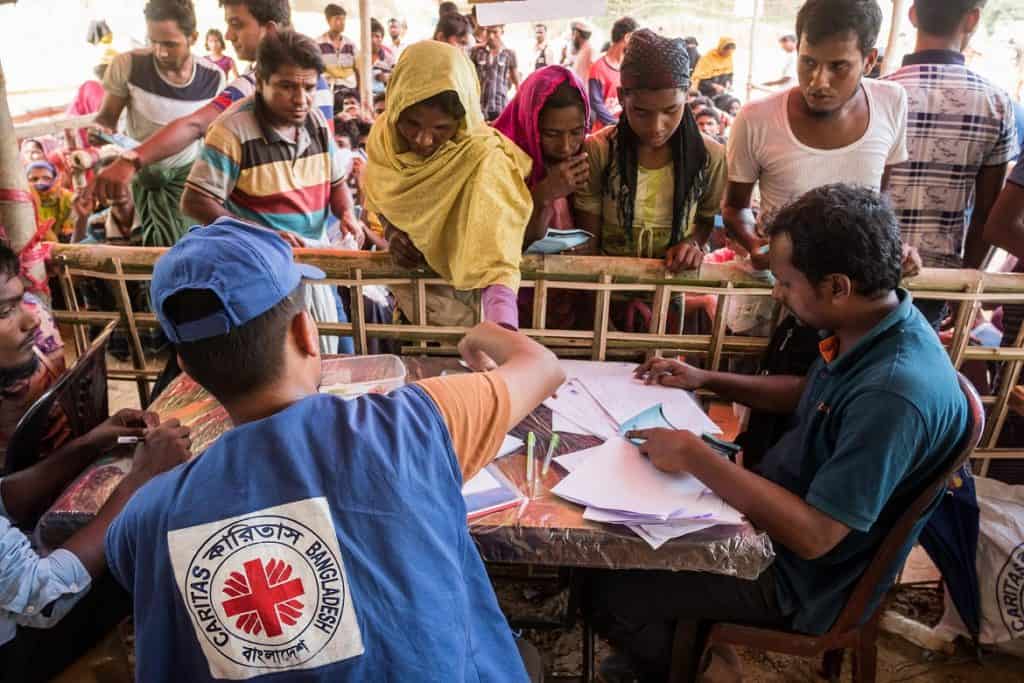The Myanmar Military were aggravating the local Buddhist extremists of Rakhine state since summer 2017 to engage in an ethnic battle against the Rohingyas. The CEO of Fortify Rights, Matthew Smith regarded it as “a decision made to effectively perpetrate atrocity crimes against the civilian population.”
As a final blow, the Myanmar Military was successful in expelling one million Rohingyas from their homeland towards an appalling journey of unforeseen and wretched future.
Current Refugee Camps in Bangladesh
Majority of the Rohingya refugee camps were constructed in the south eastern peninsula of Bangladesh, surrounding Cox’s Bazaar among which Kutupalong and Nayapara are the two registered ones. Numerous small to large scale camps of various capacities exists in the entire area encompassing Nayapara at South to Kutupalong at North, like Hakimpara, Unchiprang, Ali Khali, Jadimura etc. However, continuous flooding of Rohingyas into Cox’s Bazaar has resulted into springing up of spontaneous settlements in the surrounding countryside of Nayapara and Kutupalong
In this regard, Pavlo Kolovos, the Head of missions of Doctors Without Borders/Médecins Sans Frontières (MSF) told- “The thing I find most striking about this situation is its magnitude – the sheer number of people who have crossed the border in a short space of time, barely six months. In fact, people continue to arrive today.” Among the one million Rohingya refugees at Bangladesh 7.2lakhs settled in and around Kutupalong area, whereas 1.1lakhs resides in and around Nayapara area. Most of the Rohingyas have arrived barely with any belongings, therefore, demand of aid and resources are continuously increasing.
Conditions of the Camps
Living conditions in the Rohingya camps surrounding Cox’s Bazaar are dire. The sheer population accommodated themselves in densely swarming and overpopulated makeshift settlements surrounding Cox’s Bazaar. Their shelters are mostly made of plastic and bamboo, packed closely together. The exhausted population density of the camps is around 90persons per thousand square feet. According to UN officials
The camp has no site planning – it’s just a massive amount of people who settled on a relatively vacant plot of land in a rural area. So, it basically looks like a slum in a rural area. And they completely overwhelmed the host farmers who were settled there.
Many of unplanned camps have been built up in areas that are susceptible to flood and landslides, there ore each monsoon might ruin those temporary camps.
Most of the camps severely lack access to shelter, drinking water, sanitation, and health care. “It is unacceptable that watery diarrhea remains one of the biggest health issues we see in the camps. The infrastructure to meet even the most basic needs of the population is still not in place, and that seriously affects people’s wellbeing.” says Pavlo Kolovos. Without proper aid and services, people are becoming more prone to fatal diseases, moreover of elephant’s attacks from nearby jungles.
Health Aid
Health concerns linked to overcrowded and unhygienic conditions of the campsites are still a burning problem. “It is unacceptable that watery diarrhea remains one of the biggest health issues we see in the camps,” says Pavlo Kolovos. In monsoon, sudden outbreaks of communicable cholera, typhoid, hepatitis etc. become a serious threat. In combination, all those factors of sheer population size, dense-crowded conditions, inadequate shelter, and low immunization levels among the refugees, engenders an alarming public health situation.
The MSF already have treated more than 5500 cases of measles, 6000 cases of potentially fatal disease diphtheria and more than 1000 cases of wounds related to sexual violence. UNICEF, MSF, and other agencies in support with Bangladeshi Ministry of Health, have already vaccinated more than half a million people against deadly diseases. UNICEF, MSF, and other voluntary organizations are continuously working to develop the conditions of the malnourished children. To improve the well-being of the refugees, UNICEF has dug hundreds of waters bore wells, and installed thousands of latrines. Learning and recreational spaces for children have been expanded rapidly, but still fall well short of the needs.
Myanmar Government Position
The Myanmar government has effectively institutionalized discrimination against the Rohingyas through restrictions on marriage, family planning, employment, education, religious choice, and freedom of movement. Moreover, Rakhine State is Myanmar’s least developed state, with a poverty rate of 78 percent, compared to the 37.5 percent national average.
In 2016, Myanmar got its first democratically elected government, however it also appeared to be reluctant to advocate for Rohingyas. Moreover, the silence of current de facto leader of Myanmar Government, Aung San Suu Kii, who was awarded the Noble Peace Prize in 1991 for being a symbol of human rights protectorate in Asia, has invited severe criticism. She denied about ‘ethnic cleansing,’ accusing critics of fueling antipathy between Buddhists and Muslims. In Singapore, 2017 she told the press “I’m not saying there are no difficulties, but it helps if people recognize the difficulty and are more focused on resolving these difficulties rather than exaggerating them so that everything seems worse than it really is.”
Although she takes most of the important decisions, but it is the Myanmar military, that preserves control of three vital ministries – home affairs, defence and border affairs. Being a border state therefore, the Rakhine in under control of the Myanmar military. Su Ki claimed in September 2017 that her government had “already started defending all the people in Rakhine in the best way possible.”
Conclusion
Briefly, it’s lucid that the dreadful conditions of the Rohingyas in Bangladesh camps need enormous development in a planned manner. As of now, huge support is required to improve the health conditions of the refugees. On the other hand, international community should put pressure on the Myanmar government to repatriate the Rohingyas and initial independent observer should be deployed to supervise the government standpoint to alleviate their plight. In the next article, in relation, we will focus on the future of the crisis and role of international community.







